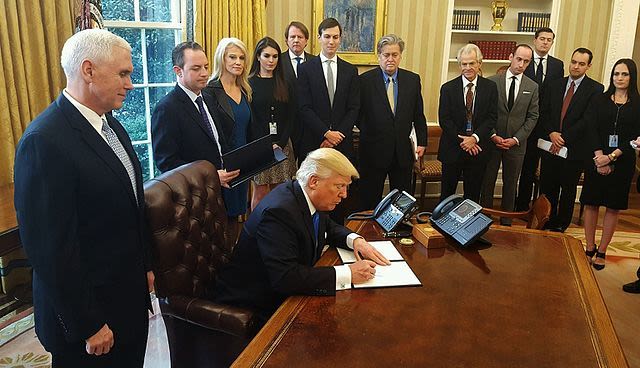Q&A: Understanding the Keystone XL Pipeline

U.S. president Donald Trump signs orders in support of the Keystone XL and Dakota Access pipelines in January.
Seattle City Council on Monday will decide on whether to oppose the Keystone XL pipeline and avoid contracts with institutions that financially support it. So here are some key questions answered leading up to the vote.
What is the Keystone XL pipeline?
The 1,179-mile pipeline would run from Canada to Nebraska, from the tar sands in Alberta to the refineries in the Gulf Coast, and transport up to 830,000 barrels of oil per day. Canada gave TransCanada the OK for the pipeline in 2010, and the company has been seeking U.S. support for nearly 10 years. The existing Keystone XL pipeline brings 550,000 barrels of oil per day.
Don't get this pipeline confused with the Dakota Access Pipeline, which is a 1,172-mile pipeline running from shale oil fields in North Dakota to Illinois. Energy Transfer Partners LP's project started in December 2014, and in February—after U.S. president Donald Trump signed executive orders supporting both Dakota Access and Keystone XL pipelines—the U.S. Army Corps of Engineers granted the permit for its final easement.
Opponents of the Keystone XL pipeline raise environmental concerns that include carbon emissions and its placement right over one of the country's largest aquifers, the Ogallala Aquifer.
While opponents to both the Keystone XL and Dakota Access pipelines have common environmental interests, the Dakota Access Pipeline involves a lawsuit with the Standing Rock Sioux Tribe, as the project runs through the tribe's sacred burial ground. The Keystone XL pipeline crosses through tribal land as well, prompting several Native American tribes to join that fight.
So what's new?
U.S. president Donald Trump approved the Keystone XL pipeline on March 24 and granted the project a construction permit, reversing former president Barack Obama's block in November 2015. This prompted 350 Seattle and other activists to draft a last-minute resolution for Seattle City Council and seek council member Kshama Sawant's support to bring it to council last week.
Trump has said the pipeline would bring thousands of U.S. jobs and reduce the country's dependency on foreign oil. Proponents have also said the pipeline is a much more environmentally friendly way of transporting oil than through other means like freight trains.
What difference can the Seattle City Council actually make?
Activists hope that the city's decision would discourage financial institutions from providing the pipeline with project-level loans. Those loans can make a large chunk of the project's business, but the city in itself may not give enough incentive to prevent them.
Seattle council members boycotted Wells Fargo in February and pulled out $3 billion in deposits from the bank. The legislation originally had nothing to do with the Dakota Access Pipelines but rather Wells Fargo's failure to comply with fair business practices. Nonetheless the council made national headlines, and activists say the city's decision led to some other major losses for the bank. (The City Council in Davis, California, for example, made a similar decision shortly after.)
